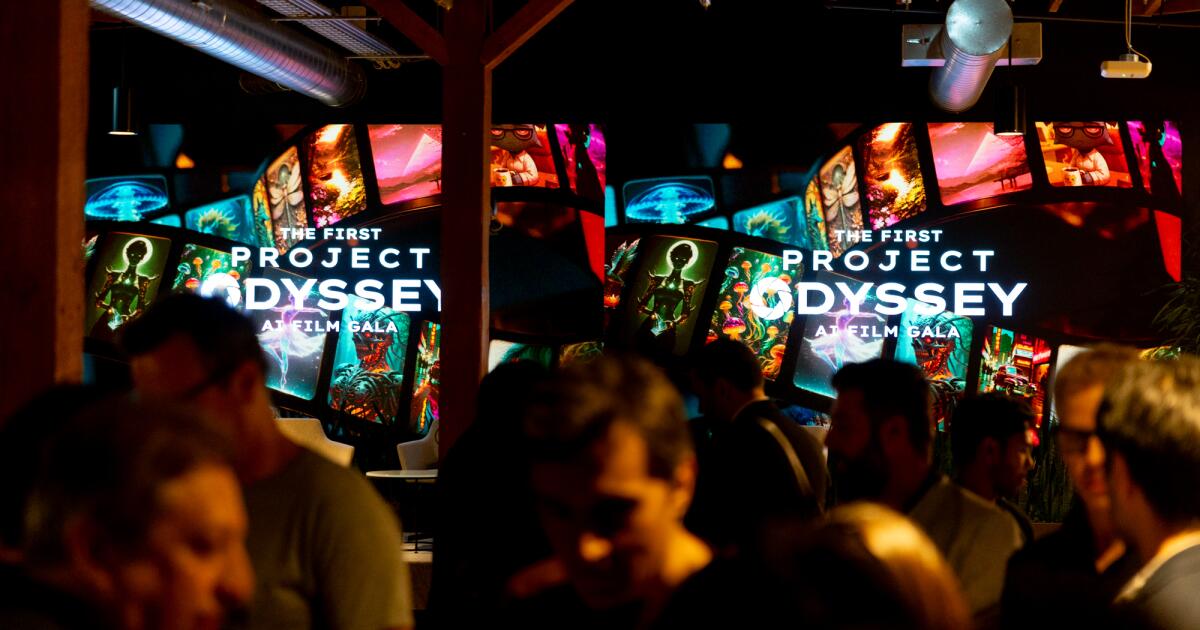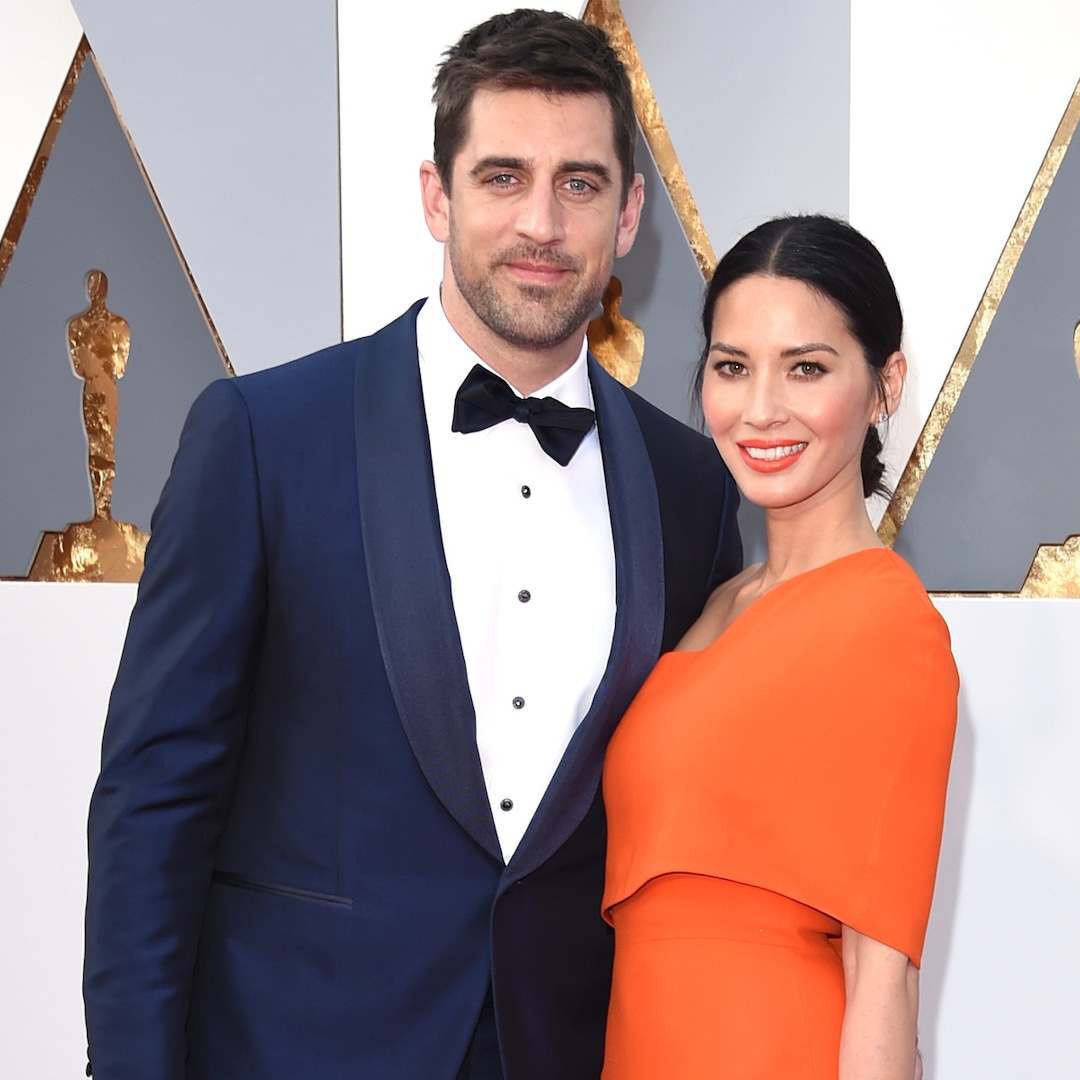San Francisco Film Commission Vice President Jack Song has been to many Hollywood movie premieres before, but this was a first — a gala led by tech enthusiasts that screened short films created with artificial intelligence.
Song, dressed in a black blazer and a green shirt, stood in the back as he watched the audience reactions swell to applause inside the San Francisco office of Andreessen Horowitz, a prominent venture capital firm that has invested in startups including ChatGPT maker OpenAI. In an event space used for activities such as podcast recordings and networking, new films were projected on large screens in front of a mostly seated audience of more than 100 people.
First up was an indie pop music video for a song called “Get to You,” by the artist Caleb Hurst. Directed by filmmaker Dylan Varella, the video showed Hurst running down a residential street as he and his environment toggled among a variety of colorful AI-generated worlds. At the end, Hurst waved goodbye to an animated version of himself, which flew away and transformed into a cartoon sun.
The audience applauded.
“The story still came from a human element, but they leveraged all the existing AI tools to help enhance that visual experience,” said Song, a startup marketing executive turned film producer, in a phone interview after the event. “That’s what filmmaking and storytelling is about. It’s about providing an audience an experience … and it’s provoking even more thoughts.”
“Get to You” was one of a handful of AI-generated films screened this month at an event called the Project Odyssey AI Film Gala, a roughly four-hour gathering — part movie premiere, part tech startup conference — meant to showcase innovations in filmmaking using AI models.
In some ways, the event had the trappings of a normal short film festival. There were awards and prizes, as well as appetizers, poke boxes and wine. But in other telling respects, it was a clear product of Silicon Valley’s incursion into Hollywood’s territory, having been organized by Civitai, a company that provides a platform for people to discover and share AI-generated art and tools.
There were no publicists guarding A-list actors and there was no red carpet. The dress code was originally billed as semiformal, but, in line with the casual attire of startups, was later revised to “business casual but feel free to dress it up!”
In Hollywood, some creatives have labeled AI as a villain, technology that will eliminate jobs and dramatically threaten their livelihoods. Those concerns came to a head in last year’s dual Hollywood strikes led by writers and actors. But in San Francisco, home to a swath of AI firms that have raised billions of dollars, there is more excitement, although tech enthusiasts did not sugarcoat its effects.
Coco Nitta, chief executive of AI-driven film studio iKHOR Labs, one of the event’s sponsors, started his keynote address with the rhetorical question on the minds of many entertainment industry workers: “Is AI going to take my job?”
Movie enthusiasts have also questioned the artistic value of AI-generated films. Oscar-winning director Guillermo del Toro recently quipped that the technology has only demonstrated that it can make “semi-compelling screensavers.”
Matty Shimura, Civitai’s vice president of partnerships who leads AI film and TV initiatives, seemed to address that culture clash in opening remarks he gave to attendees during the Sept. 13 gala.
“This started as a dream eight months ago, when I came to Civitai and … we came on this journey of how we can legitimize AI filmmaking,” Shimura said.
For the Project Odyssey film competition, creators from around the world came up with films with AI that were four minutes or shorter. Winners could earn cash, as well as credits or subscriptions to AI tools.
The goal was to encourage creators give AI a try and to see where their imagination could take them. Enthusiasm was high, with more than 1,300 entries.
“There are stigmas attached to using AI filmmaking tools, especially in traditional creative communities, but we’re trying to be transparent about how the tools are being used,” Shimura said in an interview. “The people right now who are most resistant to the technology are also those who are going to be best at using it.”
The short films showed how AI could be used in different genres, including westerns and narrative dramas.
Nitta said AI tools like those his company is building could streamline animation processes, which could prevent worker burnout. For example, his company worked with music group ROHKI to create a roughly 12-minute video shown at the gala.
The filmmakers used AI tools from iKHOR Labs to transform live-action performances into stylized animated versions of the ROHKI characters, Nitta said. The project was made by six people in about a month and a half. Without the technology, Nitta said, it could have taken six months to a year.
Tech executives cite such creations as evidence of how AI could empower artists to dream boldly and share new stories in unique ways.
“This technology is going to democratize things in a way,” Nitta said. “Indie filmmakers that have brilliant ideas in their heads, they’re gonna have a chance to show their stories to the world.”
Varella, the 30-year-old Austin-based director behind the “Get to You” video, said he was skeptical at first, concerned that AI tools could “cheapen” the art and that it could be seen as taking time away from visual effects artists.
But Varella also was curious, so he entered the competition. The process was more complicated, technically challenging and creative than Varella initially expected, he said.
“By the end of it, I felt like I had almost learned an entirely new role,” Varella told The Times. “It required creative decision-making at every turn, in a way that I didn’t expect. It felt like a new art form.”
Still, Varella said he’s concerned that in the future, as AI rapidly advances, someone could do in a day what took him around 300 hours.
“I’m kind of afraid of where it’s going, and I’m not excited about that getting easier to do,” Varella said.
More AI film competitions are coming. A second Project Odyssey contest is planned for later this year. In October, Amazon’s AWS Startups and L.A.-based FBRC.ai will host a film competition called the Culver Cup.
Several panelists at the Project Odyssey event acknowledged that there are still some shortcomings to the technology. But its capabilities are improving.
“I like to adopt the bull in the china shop theory, which is the tools you have to bend them to your will,” said Katya Alexander, president of Pillars Studio, on one of the panels. “They don’t exactly work how you would like them to yet.”
But Jason Zada, founder of AI studio Secret Level, hopes one day people will talk less about the AI tools involved in making the films and more about the movies themselves.
“I hate [it when] the question right after I show something is: ‘What tools did you use?’” Zada said on a panel. “Who f— cares? You know, did you like it? Was it good?”






